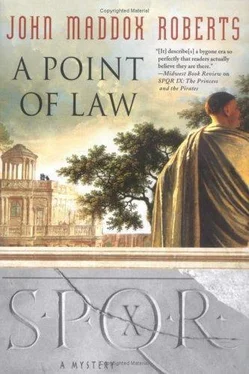John Roberts - A Point of Law
Здесь есть возможность читать онлайн «John Roberts - A Point of Law» весь текст электронной книги совершенно бесплатно (целиком полную версию без сокращений). В некоторых случаях можно слушать аудио, скачать через торрент в формате fb2 и присутствует краткое содержание. Год выпуска: 0101, ISBN: 0101, Издательство: St. Martin, Жанр: Исторический детектив, на английском языке. Описание произведения, (предисловие) а так же отзывы посетителей доступны на портале библиотеки ЛибКат.
- Название:A Point of Law
- Автор:
- Издательство:St. Martin
- Жанр:
- Год:0101
- ISBN:9780312337254
- Рейтинг книги:5 / 5. Голосов: 1
-
Избранное:Добавить в избранное
- Отзывы:
-
Ваша оценка:
- 100
- 1
- 2
- 3
- 4
- 5
A Point of Law: краткое содержание, описание и аннотация
Предлагаем к чтению аннотацию, описание, краткое содержание или предисловие (зависит от того, что написал сам автор книги «A Point of Law»). Если вы не нашли необходимую информацию о книге — напишите в комментариях, мы постараемся отыскать её.
A Point of Law — читать онлайн бесплатно полную книгу (весь текст) целиком
Ниже представлен текст книги, разбитый по страницам. Система сохранения места последней прочитанной страницы, позволяет с удобством читать онлайн бесплатно книгу «A Point of Law», без необходимости каждый раз заново искать на чём Вы остановились. Поставьте закладку, и сможете в любой момент перейти на страницу, на которой закончили чтение.
Интервал:
Закладка:
“Now,” he roared, playing to the mob, “we find our friend Marcus Fulvius lying here, drenched in his own blood, and his murderer” -he jammed a dirty finger toward my breast as if he were throwing a javelin-“standing over him!”
Hermes was about to give him a broken jaw to go with the rest, but I restrained him.
“I am innocent of this man’s blood,” I proclaimed, “and I can produce witnesses, among them the most distinguished men in Rome, to attest to my whereabouts last night!” But not, I reminded myself, for the early hours of this morning. It was not my job to point these things out to my accusers.
“Is this justice?” howled another man, this one a red-haired lout. “Are we to allow these nobles , these Caecilians to murder good Roman men? Does their high birth give them leave to shed blood on the very steps of the basilica?” There were mutters from the crowd, along with cries of “Never!” and “Down with them!” from here and there. But it was too early, the crowd still too somnolent and surprised for riot conditions.
“Lictors,” Juventius said impatiently, “arrest those troublemakers.”
“Don’t do that,” I cautioned. “It’s what they want.”
“That sounds odd coming from you,” he said. “These men are howling for your blood.”
“This is a well-rehearsed gang. Anyone can see that. They were primed for this long before they got to the Forum.”
“Will you answer us?” yelled the black-eyed man.
“Who are you to make demands of a praetor?” Juventius yelled back.
More people were forcing their way forward. The people made way for one of them, and he mounted the steps. He wore no insignia of office, but he was treated with unmistakable respect. He stepped up to the body and studied it for a moment. He was a very young man with good bearing and a tough-looking, pugnacious face. I didn’t recognize him, but such youth coupled with such respect from the people meant one thing: a Tribune of the People.
Others were gathering on the steps behind me. Cato had arrived and Appius Claudius. I beckoned Cato to me. “Who is this boy?” I asked him.
He studied the youth for a moment. “Publius Manilius. Not a supporter of Caesar and no friend of Pompey either. He’s one to watch.”
At that moment the young man we were discussing was watching me. Fulvius’s crowd were speaking urgently into his ears, which I almost expected to curl up and wither under the assault of all that garlic. At last he waved them off and came up the steps toward us.
“Marcus Fulvius,” he proclaimed in a fine, resonant voice, “has been murdered on the day he was to appear in court to denounce Decius Caecilius Metellus the Younger before the court of the praetor Marcus Juventius Laterensis. Murder has been committed, and no one had a greater reason to see Fulvius dead than you, Metellus.”
“I had every reason to show him for a fool and his witnesses as perjurers, no more than that. I never heard of him before yesterday. I need to know a man better than that to want to kill him.”
“I will convoke the Plebeian Assembly to discuss this matter,” Manilius said. “Until our decision has been reached, the election for praetors will not be held!” At this a huge shout went up.
“You can’t do that!” Cato said, when the crowd had quieted.
“You’ve been a tribune, Cato,” Manilius shot back. “And you know that I can. I will not allow a man under suspicion of murdering a citizen to be elected to high office, immune from prosecution for a full year and holding imperium to boot.”
“I have a question,” I said.
“What is it?” Manilius asked.
I pointed at the knot of Fulvius’s men. “Where are the witnesses against me? Fulvius said he would bring before the court these citizens I supposedly oppressed and robbed on Cyprus. Where are they?”
“You stand accused of a far more serious charge, Metellus,” the tribune said. “You would do well to concentrate on defending yourself against this charge, not the one you will not now be tried on.”
“I still want an answer! You!” I pointed at the red-haired flunky. “What has happened to these witnesses?”
“They-they were staying in the house of Fulvius. We were to bring them all here to the court, but we found his house deserted. You must have done away with all of them!” He spoke too fast, his eyes darting about. He had not rehearsed this. Nobody had prepared him for the question.
Manilius raised a hand. “I enjoin silence! I am calling a contio of the Plebeian Assembly to meet this afternoon, and there I will entertain motions for a trial of Decius Caecilius Metellus the Younger on the charge of the murder of Marcus Fulvius. For now I bid you all disperse!”
Slowly the big knot of people began breaking up into smaller and smaller knots, until people were distributed almost evenly in all parts of the Forum, back to the usual market-day business of the election season. It was an almost magical process and one that never ceased to amaze me, how a nearly riotous mob can revert to a peaceful gathering of citizens in a moment. I was especially glad to see it happen this time.
Fulvius’s little band still stood around the body, apparently at a loss what to do with it.
“I want to examine that body,” I said. “Maybe the way he was killed can tell us something.”
“No one touch that body until the Libitinani get here,” Juventius ordered. “You lot leave now. I will see that Fulvius is delivered to whatever family he may have in the City. Go now.”
“Do as the praetor says,” Manilius told them. “We will discuss this at the meeting, where our decisions will have legal authority. What we say here is just idle noise.”
Reluctantly they obeyed him. Then Manilius himself left, probably to round up his fellow tribunes.
“Damned tribuneship,” Father groused. “It gives too much power to men too young and inexperienced. That boy is acting like a consul, and he hasn’t a lictor to his name.”
I shrugged. “He handled the situation well enough. We might have had a riot. That’s what those men wanted, but they didn’t dare dispute with a Tribune of the People, whatever their hostility to the Senate.”
“So there’s to be no trial,” Appius said, “but no election either! If their plan is to keep you from office, they’re succeeding so far.”
“But,” I pointed out, “if he’d let the praetorship elections go on, he could have demanded that I be taken off the ballot because I’m charged with murder. This way I have a chance to clear myself and still be present for the election. In the meantime the Centuriate Assembly can amuse itself electing next year’s consuls and censors. It will just mean a longer election season. What Roman ever complains about a prolonged holiday?”
“But can you clear yourself?” Juventius asked.
“Easily,” I told him. “I’m innocent and the gods love me. Now if you will excuse me, I want a look at this body.”
The Libitinarii had arrived on the scene, dressed in their bizarre, Etruscan outfits, carrying their stretcher and accompanied by their priest. The priest went through his purification ritual, then the masked undertakers tugged the bloody toga off, then peeled away the sticky tunic, exposing the mortal remains of the late Marcus Fulvius.
There had been a tremendous effusion of blood, and it was easy to see why. He had been stabbed enough times to kill Achilles. I was no expert like my friend Asklepiodes, but even I could see that more than one weapon had been involved and that meant more than one assailant. There were stab wounds from a narrow-bladed dagger, others from a broad-bladed dagger or sword, yet others that looked like slashes, or rather wide rents, like a clumsy job of butchering. Some of the wounds gaped wide enough that I could see they were not especially deep. Loops of viscera bulged through cuts in his belly, but none of the gashes was large enough to eviscerate the man.
Читать дальшеИнтервал:
Закладка:
Похожие книги на «A Point of Law»
Представляем Вашему вниманию похожие книги на «A Point of Law» списком для выбора. Мы отобрали схожую по названию и смыслу литературу в надежде предоставить читателям больше вариантов отыскать новые, интересные, ещё непрочитанные произведения.
Обсуждение, отзывы о книге «A Point of Law» и просто собственные мнения читателей. Оставьте ваши комментарии, напишите, что Вы думаете о произведении, его смысле или главных героях. Укажите что конкретно понравилось, а что нет, и почему Вы так считаете.









